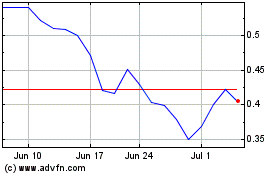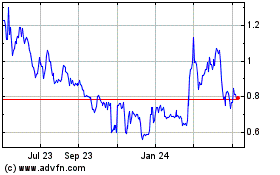Aligos Therapeutics, Inc. (Nasdaq: ALGS) a clinical stage
biopharmaceutical company focused on improving patient outcomes
through best-in-class therapies for liver and viral diseases, today
announced positive topline results from the Phase 2a HERALD study
of ALG-055009, a thyroid hormone receptor beta (THR-β) agonist, in
metabolic-dysfunction associated steatohepatitis (MASH) subjects.
HERALD (NCT06342947) is a randomized, double-blind,
placebo-controlled trial that enrolled 102 subjects with presumed
MASH and stage 1-3 liver fibrosis (F1-F3). Subjects were randomized
to receive one of four doses (0.3, 0.5, 0.7, 0.9 mg) of ALG-055009
or placebo (~20 subjects/arm) given orally once daily for 12 weeks.
Only subjects weighing >85 kg were enrolled in the 0.9 mg dose
group, with no body weight restrictions implemented in the other
dose groups. Key endpoints assessed were safety, tolerability,
pharmacokinetics, relative change in liver fat content by Magnetic
Resonance Imaging Proton Density Fat Fraction (MRI-PDFF), and other
non-invasive biomarkers/tests.
Doses of 0.5 mg to 0.9 mg ALG-055009 demonstrated statistically
significant reductions in liver fat at Week 12, with
placebo-adjusted median relative reductions up to 46.2% as measured
by MRI-PDFF. Up to 70% of subjects achieved ≥30% relative reduction
in liver fat compared to baseline.
The MRI-PDFF results are summarized in the figure below.
“The robust improvements in liver fat and other clinically
relevant biomarkers, such as lipoprotein (a), demonstrate why
potency and PK are pertinent when designing molecules aimed at
improving patient outcomes,” said Rohit Loomba, MD, MHSc, Chief,
Division of Gastroenterology and Hepatology, University of
California, San Diego. “This has been an exciting year for the MASH
space, which continues with this excellent data from Aligos’
ALG-055009, which has the potential for not only improvement in
resolution of MASH, but also fibrosis improvement. In addition, it
has potential to improve cardiovascular risk if the non-invasive
tests (NIT) data are confirmed in future trials. I look forward to
continuing to work with the Aligos team to further develop this
program.”
ALG-055009 demonstrated a favorable tolerability profile with no
serious adverse events (SAEs), or clinical hyper/hypothyroidism.
The majority of treatment emergent adverse events (TEAEs) were mild
to moderate, with one discontinuation due to worsening insomnia in
a subject with pre-existing insomnia. No clinically meaningful
findings in laboratory tests, electrocardiograms, vital signs, or
physical examinations were observed. Incidence of
gastrointestinal-related TEAEs were similar in ALG-055009 dose
groups compared to placebo. Specifically, a non-dose-related, lower
incidence of diarrhea was observed in ALG-055009 dose groups
compared to placebo.
Treatment with ALG-055009 resulted in significant reductions in
atherogenic lipids, including LDL-C, lipoprotein (a) (LpA), and
apolipoprotein B (ApoB). In addition, dose dependent increases in
sex hormone binding globulin (SHBG), a marker of THR-β target
engagement in the liver, were observed.
“When designing ALG-055009, our goal was to create a potential
best-in-class THR-β agonist through enhanced potency and a superior
PK profile,” stated Lawrence Blatt, Ph.D., MBA, Chairman,
President, and Chief Executive Officer at Aligos Therapeutics.
“Today’s data demonstrates that these enhanced pharmacologic
properties did indeed translate into robust improvements in liver
fat reduction. In addition, ALG-055009 demonstrated a favorable
tolerability profile, which is important given that MASH
medications will likely be administered for prolonged periods of
time. We believe ALG-055009 has the potential to help patients
better adhere to MASH treatment. These results indicate that
ALG-055009 warrants further development. We are currently in early
discussions with potential partners and evaluating a variety of
options to fund the continued development. We plan to complete the
activities required for a Phase 2b study by the middle of 2025 and
are assessing potential Phase 2b clinical trial designs.”
The company plans to present additional results and analyses at
a future scientific meeting later this year.
Conference Call & Webcast Details
The company will host a conference call and webcast with a slide
presentation today at 8:30am ET/5:30am PT. To access the live
webcast with slides, please visit the Presentation & Events
page on the Aligos website at www.aligos.com. Please register ten
minutes prior to its start. Following the live webcast, a replay
will be available on the company’s website for 90 days.
About MASH
One of the effects of improper diet and insufficient exercise is
the accumulation of fatty deposits in the liver, referred to as
metabolic dysfunction-associated steatotic liver disease (MASLD),
which was estimated to occur in approximately 30% of the worldwide
population as of 2019. An estimated 1.5% to 6.5% of the global
population is believed to have an ongoing inflammatory response to
these excess fat deposits, which is referred to as metabolic
dysfunction-associated steatohepatitis (MASH). In the United States
alone, the prevalence of MASH is projected to increase from
approximately 16.5 million in 2015 to 27.0 million in 2030. In the
absence of changes in diet and exercise, the inflammation inherent
in MASH persists and may result in progressive fibrosis of the
liver, which may result in cirrhosis. These fibrotic changes are
associated with numerous morbidities including recurrent
hospitalization for complications of cirrhosis, hepatocellular
carcinoma, need for liver transplant, and death. The first drug to
treat this growing patient population, a THR-β agonist, was
recently approved.
About the HERALD Study
HERALD (NCT06342947) is a randomized, double-blind,
placebo-controlled trial that enrolled 102 subjects with presumed
MASH and stage 1-3 liver fibrosis (F1-F3). Subjects were randomized
to receive one of four doses (0.3, 0.5, 0.7, 0.9 mg) of ALG-055009
or placebo (~20 subjects/arm) given orally once daily for 12 weeks.
The primary endpoint was relative change in liver fat content by
Magnetic Resonance Imaging Proton Density Fat Fraction (MRI-PDFF)
at Week 12. Safety, pharmacokinetics (PK) and other non-invasive
biomarkers/tests previously shown to be impacted by treatment with
thyroid hormone receptor beta (THR-β) agonists were also
evaluated.
About ALG-055009
ALG-055009 was designed to be a potential best-in-class thyroid
hormone receptor beta (THR-β) agonist discovered by Aligos for the
treatment of metabolic dysfunction-associated steatohepatitis
(MASH). Recent topline data from the Phase 2a HERALD study
demonstrated a favorable tolerability profile with significant
reductions in liver fat as measured by MRI-PDFF following once a
day, low oral dose.
About Aligos
Aligos Therapeutics, Inc. (NASDAQ: ALGS) is a clinical stage
biopharmaceutical company founded with the mission to improve
patient outcomes by developing best-in-class therapies for the
treatment of liver and viral diseases. Aligos applies its science
driven approach and deep R&D expertise to advance its
purpose-built pipeline of therapeutics for metabolic
dysfunction-associated steatohepatitis (MASH) and viruses with high
unmet medical need such as hepatitis B and coronaviruses.
For more information, please visit www.aligos.com or follow us
on LinkedIn or X.
Forward-Looking Statements
This press release contains forward-looking statements within
the meaning of the U.S. Private Securities Litigation Reform Act of
1995. Any statements in this press release that are not historical
facts may be considered “forward-looking statements,” including
without limitation, statements regarding Aligos’ research and
development activities, including Aligos’ goals in designing
ALG-055009, MASH medications being administered for prolonged
periods of time, ALG-055009’s potential for greater patient
adherence, ALG-055009’s results indicating that ALG-055009 warrants
future development, Aligos’ discussions with potential partners and
evaluation of options to fund the continued development of
ALG-055009, Aligos’ plans to complete the activities required for a
Phase 2b study and Aligos’ assessment of potential Phase 2b
clinical trial designs. Such forward looking statements are subject
to substantial risks and uncertainties that could cause our
development programs, future results, performance, or achievements
to differ materially from those anticipated in the forward-looking
statements. Such risks and uncertainties include, without
limitation, risks and uncertainties inherent in the drug
development process, including Aligos’ clinical stage of
development, the process of designing and conducting clinical
trials, the regulatory approval processes, and other matters that
could affect the sufficiency of Aligos’ capital resources to fund
operations. For a further description of the risks and
uncertainties that could cause actual results to differ from those
anticipated in these forward-looking statements, as well as risks
relating to the business of Aligos in general, see Aligos’
Quarterly Report on Form 10-Q filed with the Securities and
Exchange Commission on August 6, 2024 and its future periodic
reports to be filed or submitted with the Securities and Exchange
Commission. Except as required by law, Aligos undertakes no
obligation to update any forward-looking statements to reflect new
information, events or circumstances, or to reflect the occurrence
of unanticipated events.
Investor ContactAligos Therapeutics, Inc.Jordyn
TaraziVice President, Investor Relations & Corporate
Communications+1 (650) 910-0427jtarazi@aligos.com
Media ContactInizio EvokeJake RobisonVice
PresidentJake.Robison@inzioevoke.com
A photo accompanying this announcement is available at
https://www.globenewswire.com/NewsRoom/AttachmentNg/f305238a-fd16-4b0d-85d9-5bc31c7dacc2
Aligos Therapeutics (NASDAQ:ALGS)
Historical Stock Chart
From Nov 2024 to Dec 2024

Aligos Therapeutics (NASDAQ:ALGS)
Historical Stock Chart
From Dec 2023 to Dec 2024
